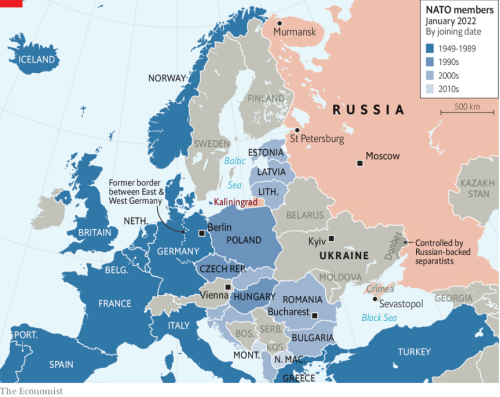When
it comes to war, mainstream media voices in the U.S. are almost
always for it, even when it could conceivably escalate to a nuclear
exchange.
That’s
a disturbing lesson reinforced by recent U.S. media coverage of the
Russia-Ukraine crisis. The basic narrative is that Putin’s
Russia is the aggressor, the U.S. is the defender of democracy, and
that U.S. actions are high-minded even when they involve weapons
sales, troop
deployments,
and draconian economic sanctions.
You
don’t get more mainstream than David Brooks and Jonathan
Capehart on
PBS,
so I tuned in to watch their “debate” (2/18) on the
issue. Both men expressed their approval of Democrats and Republicans
coming together to support the Biden administration’s hardline
against Russia. Bipartisan unity is to be celebrated when it comes to
warmongering, I suppose. Especially revealing was David Brooks’s
quick dismissal of left/right critics of the administration’s
policies:
There
will be some people who worry on the left that this is part of
American imperialism to get involved in Europe. There are some people
on the right who like Vladimir Putin. They see him as a manly,
socially conservative, authoritarian kind of guy who they kind of
like. So, I’m sure, on either end, there will be some
[critics]. But, among the mainstream of both parties, I think, right
now, there’s strong unity. The Biden administration has done an
excellent job of rallying the Western alliance. It’s been a
demonstration of why the world needs America to be a leader of the
free world.
So,
leftist critics are knee-jerk anti-imperialists; rightists critics
are authoritarian Putin-lovers. But real Americans in the mainstream
support Joe Biden and America as the “leader of the free
world.”
What’s
amazing about the “mainstream” in America is how narrow
that stream is allowed to be. Of course, as Noam Chomsky famously
wrote, it’s all about manufacturing consent. But imagine if
true diversity of opinion was allowed on PBS. Imagine if someone like
Jonathan Capehart said the following:
“The
U.S. betrayed its promise not to
expand NATO
to the borders of Russia. Even worse, the U.S. meddled in Ukrainian
politics in 2014, driving a coup and empowering neo-Nazi forces
there. Sending weapons to Ukraine is making a bad situation worse,
and constant threats are ratcheting up tensions that could lead to
war. In war, mistakes are always possible, even common, which could
lead to a wider and disastrous war between the world’s two
leading nuclear powers. Measured diplomacy is what we need, even as
the U.S. should take a step back in a region of the world that is not
directly related to our national defense.”

Imagine
that statement as a counter-narrative to the idea the U.S. is always
in the right (as well as blameless), that more
troops and weapons
are always the answer, and that Russia has no national defense issues
of its own, because NATO obviously poses no military threat to
anyone. (Imagine, for one second, seeing the expansion of NATO and
U.S. meddling in Ukraine from a Russian perspective, which we should
be willing to do because you should always plumb the mindset of your
rival or enemy.)

Truly,
the lack of diversity of opinion on foreign relations and war is
startling in U.S. media. It’s almost as if we have an official
state media, isn’t it, comrade? I still remember Tass
and Pravda
from the days of the Soviet Union; who knew that today the U.S. would
have its very own versions of them, while still applauding itself as
the unbesmirched leader of the “free” world?

